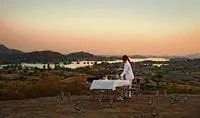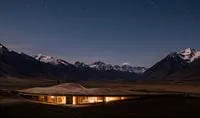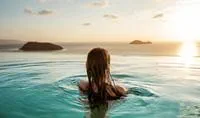Destination guide: Namibia
Namibia is such a unique destination in sub-Saharan Africa, offering some truly exceptional landscapes and experiences that you can’t find elsewhere. We’ve put together this guide to explain why it’s one of our favourite countries in Africa, and why it should be on your must-see list.

Our Namibia specialists know it inside out and can tailor something specific to your interests, so if this whets your appetite, give us a call to start planning your trip.
Jump straight to your question:
- What's so special about Namibia?
- What kind of person would enjoy a holiday here?
- Is it suitable for families?
- What about for honeymooners?
- Should I fly or drive around the country?
- Do you offer guided road trips?
- Is Namibia suitable for a first time trip to Africa?
- I've seen most of Africa, what's going to impress me?
- What kind of experiences can I expect?
- What is the wildlife like?
- What are the hot spots for photography?
- When is the best time to travel?
What's so special about Namibia?
Namibia is the second least populated country in the world (after Mongolia) so it's impossible not to be blown away by the endless skys and open landscapes as well as the sheer lack of people. The climate and geography is dictated by the cool Benguela current, which blows the mist in from the Atlantic Ocean, nourishing the arid deserts and creating the vast sand dunes over thousands of years. Unlike the savannah plains of East Africa, the floodwaters of many southern Africa safari destinations, Namibia is arid and unspoilt with dunes, mountains, dry riverbeds and chalky pans. You’ll find desert-adapted wildlife, tribes such as Himba and San who travel miles in search of food and water, and unforgettable scenery everywhere you look.
What kind of person would enjoy a holiday here?
Namibia has so much to offer from spectacular scenery to Big Five game viewing to adventure activities that it can suit absolutely anyone. You can’t help but be blown away by the awe inspiring views and you can also get your fill of game viewing with some superb wildlife to be seen on safari in Etosha. If you’re active and outdoorsy, Namibia is almost unrivalled in the activities you have to choose from – hiking, sand boarding, quad biking, kayaking and horse-riding to name a few. Whether you’re a couple in their 30s, 40s or 50s, on your honeymoon, or a family looking for an adventure, Namibia has something great to fit the bill.
Is it suitable for families?
Absolutely; there are so many fun and exciting activities on offer that it is perfect for families with children of all ages. Go kayaking with seals at Walvis Bay, search for geckos and beetles in the sand-dunes with a guide, enjoy a bit of dune-bashing in a four wheel drive at Sandwich Harbour, race each other to the top of Big Daddy, Sossusvlei’s tallest dune, and learn to use bows and arrows with the San Bushmen. Namibia operates on the same time zone as the UK, so if you are flying from London the jet lag will be non-existent. Most of Namibia is also malaria-free as well, making it a perfect choice for families wanting to avoid this risk. Namibia is a vast country and the main attractions to tend to be around a 6 hour drive away from one another or a short flight. If you are driving, as long as you have some good audio books to keep the youngsters entertained, the hours should fly by!
What about for honeymooners?
Namibia is a fantastic destination for a honeymoon whether you want road trip adventure driving around this stunning country or you travel by air from place to place. Spend a night sleeping out under the African stars on the deck of your room, feast on a private picnic in the dunes at Wolwedans, race each other on quad bikes at Serra Cafema, the options are endless to have an unforgettable first few weeks as a married couple.
Should I fly or drive around the country?
If you have a short amount of time and want to fit a lot in then flying around Namibia does make the most sense but it is of course the more expensive option. It will allow you more time in each location to enjoy activities from the lodges, and offers some incredible aerial views of the landscapes beneath you, so there are plenty of benefits to flying.
If you want to slow down a bit and really take in everything that Namibia has to offer then you can experience all of this with an amazing self-drive road trip. The roads are mainly gravel roads so we recommend a 4x4 for comfort’s sake, as well as better views of the wildlife in Etosha. Top tip: we’d recommend learning how to change a tyre before you go as inevitably you will end up with at least one flat tyre during your trip but we think this just adds a sense of adventure!
Of course it doesn’t have to be one or the other. Why not fly down to Sossusvlei and the NamibRand, and then out to the coast, picking up a car in Swakopmund and driving around Damaraland and Etosha for the best of both worlds?
Do you offer guided road trips?
Yes – a guided safari in Namibia is a great option for those not wanting to drive themselves, but whose budget won’t stretch to a flying safari or if you don’t want to miss out on the ever-changing scenery. We use the best guides and 4x4 vehicles, who can take you off the beaten track, show you little hidden gems such as ancient rock art sites as you drive from A to B, and their guiding really brings the destinations and national parks to life. Learn which beetle the tiny tracks in the sand at Sossusvlei belong to, or for families, enjoy spending time with your kids without having to worry about driving, refuelling, directions and so on.
Is Namibia suitable for a first time trip to Africa?
We are often asked this question and the answer is always yes. Namibia has so much to offer a first-timer to Africa and is often forgotten about next to countries like South Africa and Botswana. Along with great game viewing in Etosha, you can also visit the eerie Skeleton Coast, the spectacular dunes in Sossusvlei, the jaw dropping scenery of Wolwedans and so much more. While any trip to Namibia will usually involve a fair bit of travelling around, and you will absolutely need a sense of adventure, it is friendly, safe and very accessible.
I've seen most of Africa, what's going to impress me?
Namibia is the ultimate destination for the old Africa hand, with experiences available here that you simply cannot find anywhere else on the continent. Track black rhino on foot at Desert Rhino Camp, search for desert-adapted lions from Hoanib Skeleton Coast Camp, watch as thousands of zebras cross the stark white Etosha pan towards a waterhole, marvel at the weird and wonderful geology of the Organ Pipes near Twyfelfontein, or explore the abandoned town of Kolmanskopp which is slowly being swallowed by the desert.
What kind of experiences can I expect?
The great thing about the activities in Namibia is that the experiences are so diverse. One day you could be hot air ballooning over the red dunes in Soussusvlei and the next day you can be kayaking with seals at Walvis Bay. In the northern Damaraland area, there is so much going on from visiting the ancient rock paintings of Twyfelfontein to spending an afternoon tracking desert-adapted elephants. Then of course, there’s the game viewing in Etosha and if you head further north to Serra Cafema you can spend your day’s quad biking across the dunes in one of the most remote corners of the world and meet the Himba people and learn more about their unique way of life. The list of experiences that Namibia can offer really is endless.
What is the wildlife like?
Much of the wildlife in Namibia has had to become adapted to the dry arid conditions, offering some variations on species you find elsewhere in Southern Africa. Whether it’s the iconic oryx, Hartman’s mountain zebra, or the desert rhino, it is amazing to see these animals eke out an existence in the toughest of conditions with a real scarcity of grazing and water supply. In Etosha National Park, especially during the dry season, much of the game viewing takes place round the waterholes on the edge of the Etosha Salt Pan. The Etosha Park is home to 114 species, among the smaller animals are the honey badger, warthog, bat eared fox and the ground squirrel. Birding in Namibia is also superb, with larger species such as the Rüppel’s kohraan, flamingos and pelicans, as well as smaller curlew sandpipers and turnstones.
What are the hot spots for photography?
Namibia is a photographer’s paradise, with endless subjects to inspire you. Our top photographic spots in Namibia would include the dramatic dune-scapes of the NamibRand Reserve, congregations of wildlife on the stark Etosha Pan, aerial views of the dune sea seen from a hot air balloon or scenic flight over Sossusvlei or the Skeleton Coast, and the wizened face of a San bushman elder.
When is the best time to travel?
The best time to visit Namibia is any time from April through to October which is the dry season. The weather is typically hot (increasingly so as the year progresses), usually around 30°C in the day, getting much cooler in the evenings so we always advise packing lots of layers! November through to March is hotter and rainier, which can make the roads a bit harder to navigate, but if you don’t mind the heat you can enjoy travelling at a less busy time, and watch spectacles such as the dunes becoming carpeted in flowers overnight!
Call us on 020 8682 5068 to start planning your holiday
Why Scott Dunn?
Unique to You

- We listen to your travel goals and craft unique trips that are bespoke to you.
- We’re with you every step of your life’s travel journey, from honeymoons to family trips and beyond.
Seamless Service

- Global offices in the UK, US, and Singapore for 24/7 seamless service.
- We offer flexibility if your plans change so you can book with confidence and peace of mind.
Carefully Curated Collection

- We’ve curated an elevated collection of accommodation, experiences, and guides.
- Committed to fostering close global relationships to continue bringing you unique experiences.
Luxury in Every Sense

- We deliver a sense of luxury that matters most to you.
- Awarded Condé Nast Traveller’s Top Travel Specialists in the World 12 years in a row.





